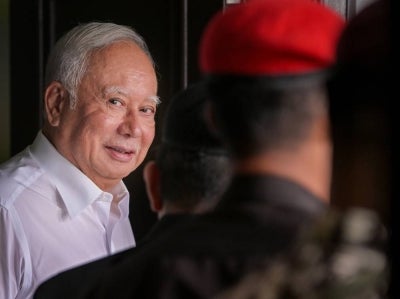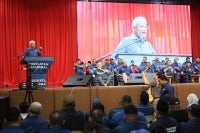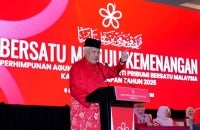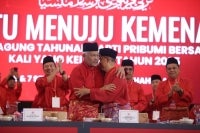Iran's retaliatory strike: Prelude to Third World War?
Understanding Iran's intentions in the recent escalation.
![Motorists drive their vehicles past a billboard depicting named Iranian ballistic missiles in service, with text in Arabic reading "the honest [person's] promise" and in Persian "Israel is weaker than a spider's web", in Valiasr Square in central Tehran on April 15, 2024. - Photo by AFP](https://www.sinarharian.com.my/sinarenglish/uploads/images/2024/04/16/2615746.jpg)
SHAH ALAM - Iran's recent retaliatory strike against Israel is unlikely to escalate into a larger conflict or initiate a Third World War, as such actions are viewed as responses to the injustices by the Zionist regime.
Geostrategist and Senior Fellow of the Academy of Strategic Research Nusantara, Professor Dr Azmi Hassan believed that the attack was not aimed at annihilating Israelis but rather to demonstrate Tehran's ability to independently confront its adversaries.
"Iran's objective isn't the destruction of Israel.
"This is evident from the fact that Tehran notified both Washington (United States) and Tel Aviv (Israel) 48 hours before the attack.
"Hence, we see Israeli defences intercepting the drones and missiles launched.
"In this case, Israel won, Iran also won because both have achieved their respective objectives," he told Sinar Harian.
The attack, which saw Iran launching over 300 drones and missiles into Israeli-occupied territory on Saturday, was purportedly in retaliation to the Israeli bombing of the Iranian consulate building in Damascus, Syria, resulting in the deaths of seven senior military officers.
Defence analyst Zaki Salleh, on the other hand, claimed that the retaliatory strike dealt a significant blow to the image of Israel Prime Minister Benjamin Netanyahu's administration as a dominant regional military power, effectively undermining its perceived invincibility.
"It is also not impossible that Netanyahu will use this opportunity to restore the image of his administration which was previously severely criticised by its own people for failing to face the attacks of Hamas.
"Earlier this year, thousands of Israelis gathered in Jerusalem, demanding increased efforts to free prisoners held in Gaza and the ousting of Netanyahu.
"The ongoing Iran-Israel confrontation has global attention, yet the humanitarian crisis in Gaza remains unresolved," he added.
On the geopolitical front, UiTM legal and human rights expert Professor Datuk Dr Rahmat Mohamad suggested that while Israel may have instigated a provocation against Iran, it does not signify the onset of a Third World War.
"Western nations are unlikely to exacerbate tensions in West Asia due to their reliance on oil production in the region," he said.
In terms of oil production, Statista.com reported that West Asian countries collectively produced approximately 30.7 million barrels per day in 2022, constituting about 31.3 percent of global output.
Iran alone contributed 2.99 million barrels per day to this figure.
Download Sinar Daily application.Click Here!














